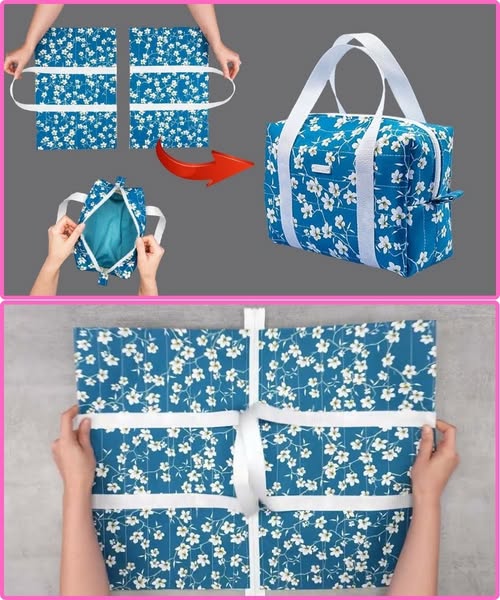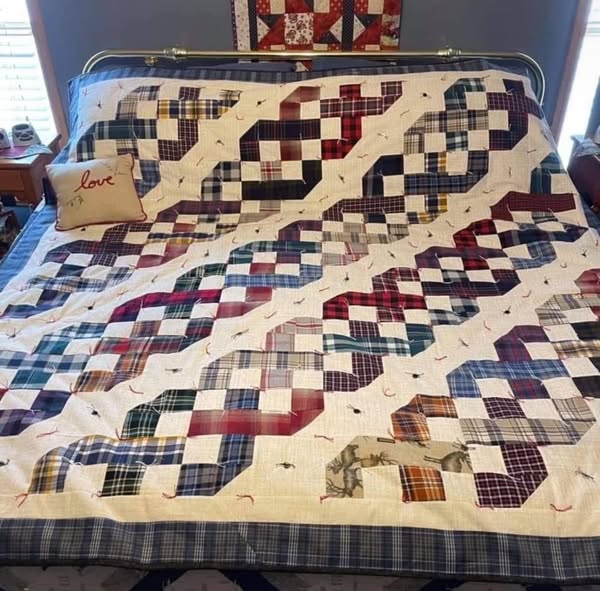
The Plaid Links Quilt Pattern is an eye-catching design that brings together the timeless beauty of plaid fabric with the sophisticated look of interlocking links. This pattern offers a perfect balance of simplicity and elegance, making it an ideal choice for quilters of all skill levels.
With its geometric shapes and versatile color palette, the Plaid Links Quilt Pattern allows for endless creativity while maintaining a sense of tradition. Whether you are making a quilt for a special occasion, a cozy throw for your living room, or a wall hanging, this pattern will undoubtedly add a touch of warmth and charm to your space.
This design takes inspiration from classic plaid patterns, incorporating squares and interwoven lines to create the illusion of linked connections. The result is a dynamic, structured quilt that exudes both comfort and style.

You can experiment with different fabric choices to match your personal taste, from muted earth tones for a rustic feel to vibrant hues for a modern twist. The Plaid Links Quilt Pattern can easily become a statement piece in your home, capturing attention while still offering a sense of familiarity and coziness.
In this article, we will guide you through the steps of creating the Plaid Links Quilt Pattern, explain the importance of fabric selection, and offer tips for assembling the blocks.
Whether you are an experienced quilter or just starting, this step-by-step guide will help you successfully create a quilt that you can be proud of. Let’s explore the elements that make the Plaid Links Quilt Pattern such a beloved choice among quilters and discover how you can bring this stunning design to life.
The Plaid Links Quilt Pattern is a geometric quilt design that focuses on the use of squares, rectangles, and interlocking links. The pattern often incorporates traditional plaid fabrics, which have crisscrossing horizontal and vertical stripes, creating a visually engaging texture. While plaid fabrics are commonly associated with country or rustic styles, this quilt pattern can be adapted to suit various aesthetics by experimenting with different color palettes and fabric choices.
At the heart of the Plaid Links Quilt Pattern are blocks that resemble linked shapes, often arranged in a grid-like structure. These blocks can be pieced together using a combination of simple quilting techniques, such as patchwork and strip piecing. The visual effect of the interlocking links creates a sense of movement within the quilt, adding depth and interest to the design. Whether you prefer a more symmetrical arrangement or a more random, flowing look, the Plaid Links Quilt Pattern offers flexibility in how you choose to assemble the blocks.
Another key feature of this pattern is its ability to incorporate both traditional plaid fabrics and modern, solid colors. You can create a more contemporary quilt by using bold, solid colors for the links while keeping the plaid fabrics for the background or vice versa. The interplay between these fabrics allows you to personalize the quilt to fit your home décor or the specific style you desire. The Plaid Links Quilt Pattern can be made as large or small as you like, making it suitable for projects ranging from throw quilts to bed-sized quilts.
When creating the Plaid Links Quilt Pattern, fabric selection plays a crucial role in bringing the design to life. The traditional approach uses plaid fabrics, which are typically made of wool, cotton, or flannel. Plaid fabrics are perfect for this pattern because their intersecting lines naturally mimic the links featured in the design. The repeating squares and lines in the fabric work harmoniously with the geometric blocks of the quilt, creating a cohesive and visually appealing finished piece.
While plaid fabrics are a staple for the Plaid Links Quilt Pattern, there’s room for creativity when choosing your fabric. You may want to incorporate solid-colored fabrics to provide contrast and make the plaid patterns stand out more. Alternatively, flannel fabrics can add extra warmth and texture, making your quilt even more cozy and inviting. You can mix different plaid patterns—such as tartan, gingham, or windowpane plaid—for added visual interest, or choose a more minimalist approach with solid fabrics in various shades.
Color choice is also an important aspect of fabric selection. For a classic, rustic look, choose muted colors such as earthy browns, deep reds, and forest greens. If you prefer a more modern twist, consider using bright colors, such as turquoise, yellow, or lime green, alongside neutrals like gray or navy blue. The Plaid Links Quilt Pattern offers a great opportunity to play with colors and textures to create a quilt that reflects your personal style.
Creating the Plaid Links Quilt Pattern can be a rewarding project that combines traditional quilting techniques with modern design elements. Here’s a step-by-step guide to help you assemble the quilt:
The result will be a beautifully crafted Plaid Links Quilt that combines classic patterns with modern appeal. This project offers plenty of opportunities for creativity, so don’t be afraid to experiment with colors and fabric choices as you work through the steps.
While the traditional Plaid Links Quilt Pattern is beautiful on its own, there are many creative variations you can explore to make your quilt even more unique. One way to add a personal touch is by experimenting with color placement. For example, you can create a gradient effect by gradually transitioning from dark to light colors or mixing different shades of the same color family for a more harmonious look.
Another fun variation is to incorporate additional patterns into the quilt. You could add diamond shapes, triangles, or hexagons to create a more complex and intricate design. Alternatively, use appliqué techniques to add motifs such as leaves, flowers, or stars to the quilt. These elements can enhance the overall aesthetic and make your quilt one-of-a-kind.
For quilters looking for a more contemporary look, consider using modern plaid fabrics or fabrics with bold prints for the link blocks. This will give the Plaid Links Quilt Pattern a more updated feel while still maintaining its traditional charm. Additionally, experimenting with minimalist designs, where you use fewer colors or simpler patterns, can create a sleek and modern version of the quilt.
If you’re feeling adventurous, you can also play with the size of your blocks. Larger blocks can make a bold statement, while smaller blocks offer more intricate details. Adjusting the size of the blocks can also change the overall feel of the quilt, so don’t be afraid to experiment and find what works best for you.
Join our VIP broadcast list and gain access to exclusive patterns, all for free. As a VIP member, you’ll receive the best patterns daily, delivered directly to your device. ✨📱 It’s a unique opportunity to stay up-to-date with the latest trends and designs, curated just for you. Don’t miss out on enhancing your projects and discovering new inspirations with the best patterns every day! 🎨🔝
The Plaid Links Quilt Pattern offers a perfect blend of tradition and creativity, allowing quilters to experiment with different fabrics and techniques while producing a timeless design.
Whether you’re making a quilt for a special occasion or simply want to add a cozy touch to your home, this pattern is versatile enough to suit any project.
From fabric selection to creative variations, there are endless possibilities when working with the Plaid Links Quilt Pattern. We’d love to hear your thoughts and suggestions—please feel free to leave a sincere opinion below.
